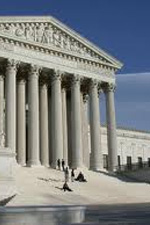Freedom of Religion and the EEOC
Last October we told you about a case set to be argued before the Supreme Court, Hosanna-Tabor Evangelical Lutheran Church v. EEOC. The Case was argued on October 5, and the Court rendered its unanimous opinion today. The opinion is not surprising, but, the concurring opinion of Justices Alito and Kagan was somewhat unexpected.
The facts are straightforward. Cheryl Perish was a “commissioned minister” in the church and taught in their school. A “commissioned minister” in that church is essentially a lay person who has completed certain religious courses and has been appointed by the congregation as a commissioned minister to teach in the school.
Ms. Perish was diagnosed with narcolepsy and took a leave of absence at the beginning of the school year. Approximately 6 months later she notified the church that she was ready to return. The church told her that her position had been filled, and that they were not sure she was ready to resume teaching. Perish told the church that “she had spoken with and attorney and intended to assert her legal rights”, presumably under the ADA. She was ultimately fired, and one of the reasons cited by the church was her statement that she would sue the church. Civil law suits against the church is a violation of one of the church’s beliefs.
In upholding the church’s right to fire her the Court relied upon what is called the “ministerial exemption”. In other words, the First Amendment bars the federal government (here, the EEOC) from telling a church that it cannot fire someone deemed to be a “minister”. The Court reviewed her duties and responsibilities and determined that she qualified for this “ministerial exemption”.
The concurring opinion of Justices Alito and Kagan takes the decision one step further. Rather than determine on a case by case basis whether someone is truly a “minister”, they believe that only the church should have the power to make this decision. (See page 39)
What matters in the present case is that Hosanna-Tabor believes that the religious functions that [Ms. Perish] performed made it essential she abide by the church’s doctrine of internal dispute resolution [i.e., no lawsuits when it comes to matters of the church]; and the civil courts are in no position to second guess that assessment. This conclusion rests not on [Ms.Perish’s] ordination status or on her formal title, but rather on her functional status as the type of employee that a church must be free to appoint or dismiss in order to exercise the religious liberty that the First Amendment guarantees. [emphasis supplied]
Those words from Justices Alito and Kagan are the essence of our First Amendment right.
At the risk of making a long post even longer, you may want to read pages 11 through 15 of the decision to understand the origins of this First Amendment right.
5 Comments

The website's content and articles were migrated to a new framework in October 2023. You may see [shortcodes in brackets] that do not make any sense. Please ignore that stuff. We may fix it at some point, but we do not have the time now.
You'll also note comments migrated over may have misplaced question marks and missing spaces. All comments were migrated, but trackbacks may not show.
The site is not broken.

A thorny issue for sure, SOS. Two competing claims to the First Amendment Right to Free Speech, hmmmm. Only one can prevail. Is there no middle ground? Not really.
The way I read the decision is that the individual, as an employee, has to be subordinate to religious decisions. Or, the individual does not have to be associated with any particular religion or church if he or she does not want to follow its precepts. That the individual claims a disability and seeks protection under the wings of the ADA is of no import here. Religion, that is the particular church, prevails. The church, having a “ministerial exemption,”? is the trump to the First Amendment.
I think that the court recognized that the church in question had a policy of non-litigation to settle differences. As a minister of that church, an employee, Cheryl Perish accepted that condition when taking the position. By threatening to sue for her job back, she violated a term of employment. Ergo, she loses her employment. Even having a disability? Hmmm. This is a precedent with vast implications.
What further applications could this ruling have? Could the collective good totally trump the First Amendment Rights?
Congress shall make no law respecting an establishment of religion, or prohibiting the free exercise thereof….? Seems simple enough.? Freedom of, not freedom from.
I see the liberal Block’s opinion as predictable as they are desperate to keep at least a barge-pole’s distance from anything that even smells of religion.? Irony surrounds the Supremes at times.
I’ll go along with Alito & the First Amendment.
Hallelujah!!!!! First of all a unanimous decision from the SCOTUS. Second, Justices Kagan and Alito have rendered a concurring opinion that supports the First Amendment. I have HOPE and am on Natural Ecstasy (not the illegal drug). Ha! Love those endorphins from the gym!